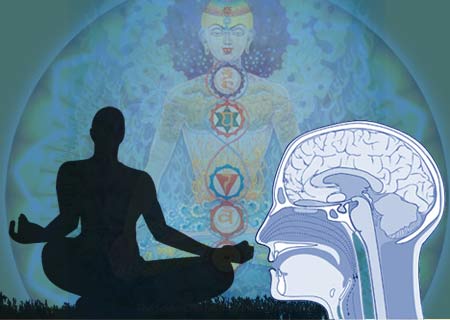Neuroplasticity and Improved Cognitive Function
Harvard Unveils MRI Study Proving Meditation Literally Rebuilds The Brain’s Gray Matter In 8 Weeks. See also Eight weeks to a better brain. Meditation study shows changes associated with self-awareness, stress, learning and memory, compassion, and introspection.
 Meditation Can Change Your Brain for Better and Longer. This survey of meditation research compiled by Kevin W Chen, Ph.D. summarizes reports on how meditation could slows the aging process, rewires the brain, and how meditation can lead to actual structural changes in the brain! This can be seen in brain imaging research even after a simple 20-minutes meditation.
Meditation Can Change Your Brain for Better and Longer. This survey of meditation research compiled by Kevin W Chen, Ph.D. summarizes reports on how meditation could slows the aging process, rewires the brain, and how meditation can lead to actual structural changes in the brain! This can be seen in brain imaging research even after a simple 20-minutes meditation.
Can Mindfulness Rewire Our Brains? One of the most revolutionary and empowering insights coming from cutting-edge neuroscience is the fact that we can change our brains by thinking different thoughts. Positive, productive thinking can actually change the biological structure of our brains.
Neural Basis for Benefits of Meditation. In a newly published neurophysiological review, Brown University scientists propose that meditation practitioners gain enhanced control over sensory cortical alpha rhythms that help regulate how the brain processes and filters sensations, including pain, and memories such as depressive cognitions.
Meditation Appears to Produce Enduring Changes in Emotional Processing in the Brain. Participating in an 8-week meditation training program can have measurable effects on how the brain functions even when someone is not actively meditating.
Meditation Makes You More Creative. This study is a clear indication that the advantages of particular types of meditation extend much further than simply relaxation. The findings support the belief that meditation can have a long-lasting influence on human cognition, including how we think and how we experience events.
Meditation causes neurophysiological changes in the brain at the cellular level, including elevated parasympathetic nervous system activity.
Meditation Correlated with Structural Changes in the Brain. The benefits of meditation have received newfound evidence from neuroscience in the last five years, as researchers are finding real physiological changes due to a sort of formally practiced introspection.
Daily Meditation as Effective for Depression and Anxiety as Antidepressants.
 Effect of Meditation on Cognitive Functions in Context of Aging and Neurodegenerative Diseases. Reviewed studies suggested a positive effect of meditation techniques, particularly in the area of attention, as well as memory, verbal fluency, and cognitive flexibility. These findings are discussed in the context of MRI studies suggesting structural correlates of the effects. Meditation can be a potentially suitable non-pharmacological intervention aimed at the prevention of cognitive decline in the elderly.
Effect of Meditation on Cognitive Functions in Context of Aging and Neurodegenerative Diseases. Reviewed studies suggested a positive effect of meditation techniques, particularly in the area of attention, as well as memory, verbal fluency, and cognitive flexibility. These findings are discussed in the context of MRI studies suggesting structural correlates of the effects. Meditation can be a potentially suitable non-pharmacological intervention aimed at the prevention of cognitive decline in the elderly.

Short-term meditation induces white matter changes in the anterior cingulate. Even short term meditation affects white matter changes in the brain.
Impact of Mindfulness-Based Stress Reduction training on intrinsic brain connectivity. Meditation training alters intrinsic functional connectivity in ways that may reflect a more consistent attentional focus, enhanced sensory processing, and reflective awareness of sensory experience.
Impact of meditation training on the default mode network during a restful state. Meditation increases present moment awareness.
The unique brain anatomy of meditation practitioners: alterations in cortical gyrification. Previous studies have shown increases in grey and white matter in the brains of long-term meditators. This study found significant differences in the pattern and degree of cortical folding (gyrification) of meditators in several brain regions. The functional implications of larger cortical gyrification remains unknown, but the increased size of the insula has some intriguing possibilites.
The Effect of Meditation on Brain Structure: Cortical Thickness Mapping and Diffusion Tensor Imaging. Long-term meditators have structural differences in both gray and white matter in the brain.
Mindfulness practice leads to increases in regional brain gray matter density. Researchers at Harvard Medical School found that mindfulness practice leads to increase in grey matter density in brain regions involved in learning and memory processes, emotion regulation, self-referential processing, and perspective taking.
Meditators and non-meditators: EEG source imaging during resting. The neuroplasticity effects of long-term meditation practice are carried over into non-meditating states.
Meditation improves cognitive performance and enhances emotional regulation.
Meditation evokes a brain state of enhanced perceptual clarity and decreased automated reactivity.
Mechanisms of white matter changes induced by meditation. Brain white matter neuroplasticity affected by short-term meditation.
Meditation increases the depth of information processing and improves the allocation of attention in space. Practicing meditation enhances the speed with which attention can be allocated and relocated, thus increasing the depth of information processing and reducing response latency.
"Mind the trap": mindfulness practice reduces cognitive rigidity. Mindfulness meditation reduces cognitive rigidity via the tendency to be "blinded" by experience.
Stepping out of history: Mindfulness improves insight problem solving. Mindfulness improves creativity.
Meditation changes positive and negative self-views by modifying the brain's cognitive and attention neural networks.






 23 Ways to Boost Your Immune System. #1: Meditation
23 Ways to Boost Your Immune System. #1: Meditation